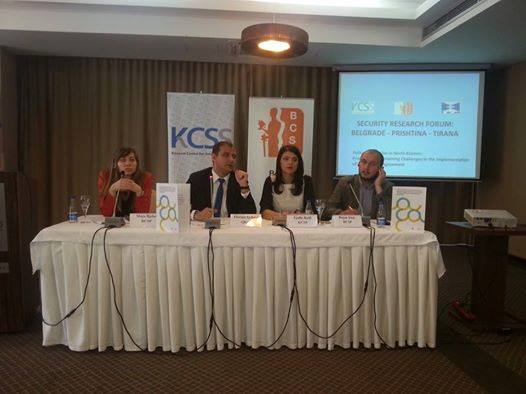10/04/2014

On 10th of April 2013, the Kosovar Centre for Security Studies (KCSS), Belgrade Centre for Security Policy (BCSP) and Institute for Democracy and Mediation (IDM) held the 5th meeting of the Security Research Forum: Belgrade-Prishtina-Tirana.
The conference presented the first public analysis on the progress and challenges to the integration of Serbian police officers in Kosovo Police as a part the Brussels Agreement. The research paper was jointly made by two independent think tanks - Belgrade Centre for Security Policy (BCSP) and Kosovar Center for Security Studies (KCSS).
For the first time in public, the publication revealed the details about the process of integrating former members of MUP in Kosovo Police. The publication mainly assessed the security clearance process, the training of the integrated Serbian police members, the function of the KP Regional Commander in the northern part of Kosovo, and the treatment of the former Serbian MUP members in other parts of Kosovo. The publication provided an alternative analysis when the process is not transparent and open for public debate.
The support and gratitude of the international stakeholders in Kosovo was emphasized during the opening speeches of the Norwegian and British Ambassadors in Kosovo. Both Ambassadors stressed out the importance of the integration of Serbian police officers in regards to the future of the Belgrade-Prishtina dialogue and also for the strengthening the rule of law in the region of Western Balkans.
As Florian Qehaja emphasised the cooperation between two independent think tanks from Belgrade and Prishtina as an achievement in itself since it breaks the taboo of non-cooperation and hostility between the two communities, the publication aims to increase the transparency and help governments by criticism on how to improve the implementation of the Agreement.